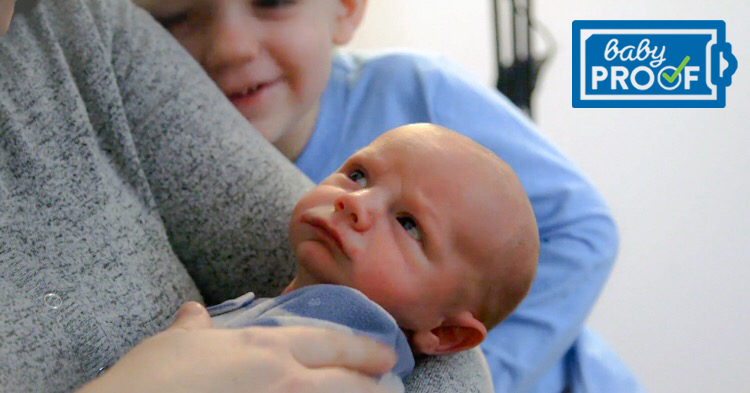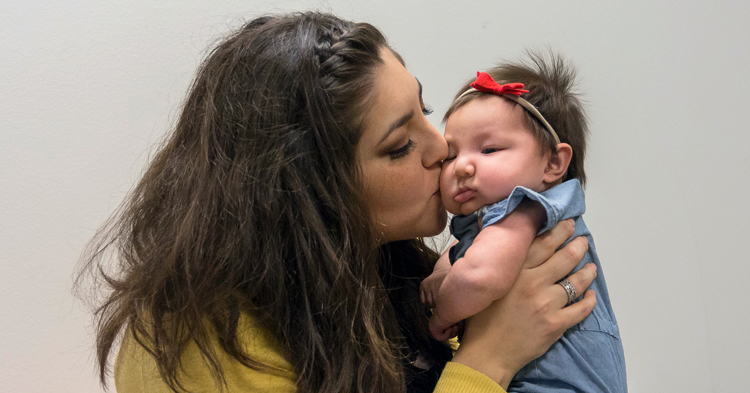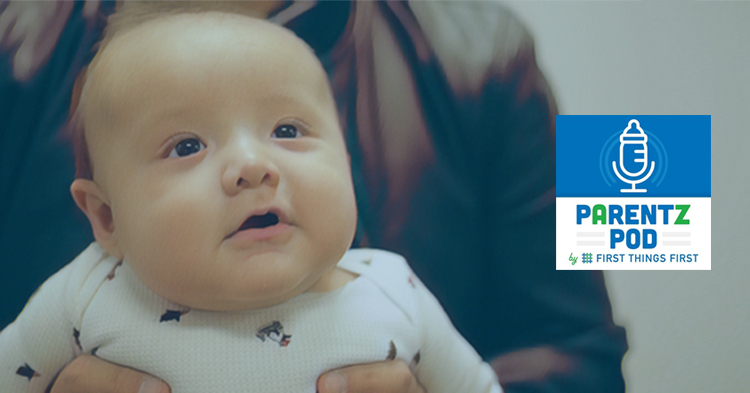Your infant depends on you for everything. She needs you to feed and change her, cuddle and kiss her, play with her and comfort her. When you respond quickly to her needs, she will cry less. She feels safe and learns to trust.
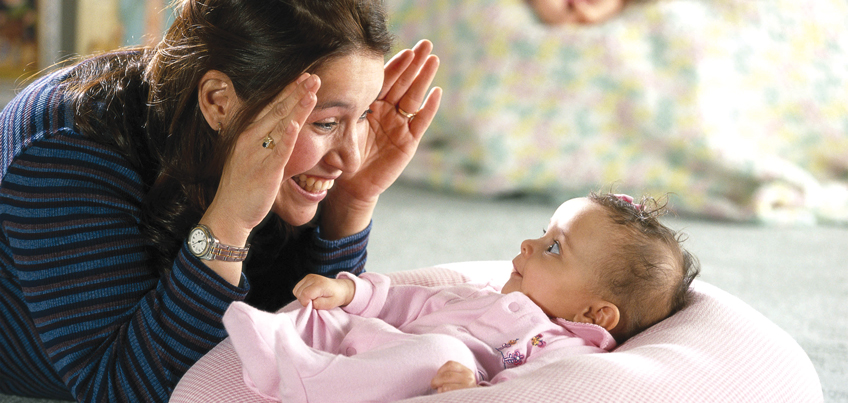
How Your Baby Is Developing
Your baby’s brain is growing faster now than at any other time. Your loving care helps her develop. From birth to 3 months, she will begin to:
- Grow quiet when she hears familiar voices and sounds.Turn toward sounds.
- React to loud noises.
- Make soft sounds.
From 3 to 6 months, she will:
- Begin to make sounds like “ga,” “ooh” and “ba.”
- React to a change in your tone of voice.
Comfort Your Baby When He Cries
When your baby cries, pick him up right away. See if he is wet, hungry or in pain. Take him into a dark, quiet room. Try different ways to comfort him, and find out what works for him. Here are some ideas:
- Wrap him snugly in a blanket.
- Walk with him in a carrier on your chest.
- Hold him close to your chest, with skin-to-skin contact.
- Gently rock him up and down or in a rocking chair.
- Hum, sing or speak softly.
- Lay him on his tummy across your knees, and gently pat his back.
- Help him suck his thumb or fist if he wants. For tips on pacifier safety, see the Infant Safety page of this guide.
- If you need more help, call Birth to Five Helpline.
If Your Baby Cries for Hours
All babies cry. Some babies cry harder and longer than others. This is called colic. It may occur between 3 weeks and 3 months. Most babies with colic are healthy. Ask your doctor to be sure. To help prevent colic, try not to tire your infant, especially in the late afternoon and evening.
If he starts to frown, yawn, turn red, squirm or whimper, see if you can comfort him. Sometimes nothing helps. This does not mean you are a bad parent. You just have to be patient.
Never Shake a Baby
Never hit or shake your baby—this can cause blindness, brain damage or even death. If you start to lose your temper, put your baby in her crib, walk into the next room and count to 10. If you cannot calm down, get help. Ask a friend or relative to give you a break. Or contact Childhelp.
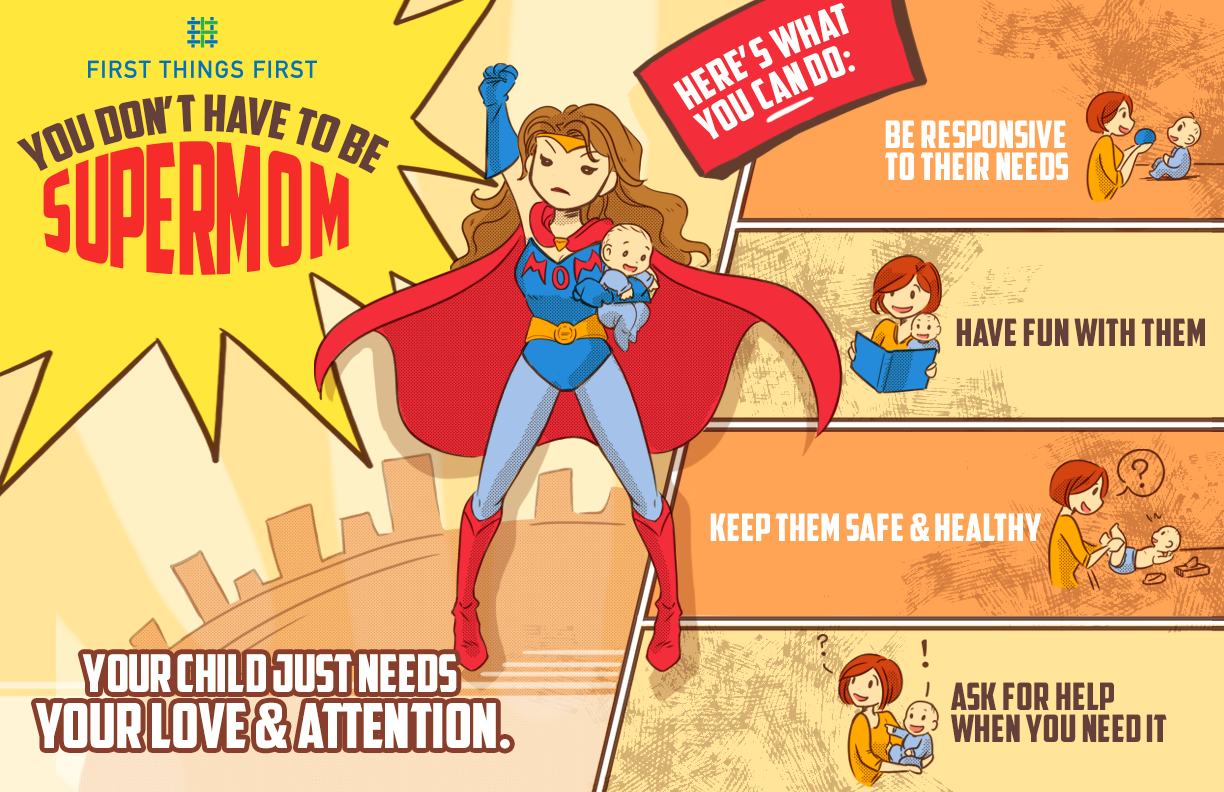
THINGS YOU CAN DO
 Give Your Baby Loving Care
Give Your Baby Loving Care
- Hug, cuddle and kiss your baby.
- Talk to him in a soothing voice or sing to him. Get more ideas from Read On Arizona.
- Make routines for feeding, changing, napping and bathing. Routines help babies feel safe and secure.
- Respond to your baby’s cries right away. This will not spoil him.
Protect Your Infant
- All infants need regular check-ups and vaccines. For a schedule of check-ups and shots, see the Children’s Health Care page in this guide. For more information, see Healthy Children.
- Put your infant to sleep on her back. For more information, see the Infant Safety page in this guide.
- Ask people not to smoke around your infant or in your house or car. Your infant’s lungs are still developing. Breathing smoke can make her more likely to get ear infections, asthma or sudden infant death syndrome (SIDS).
- Protect her from the sun. Use a hat, baby-safe sunscreen and a stroller with a sunshade. Dress her in light-colored, loose clothing. Cover as much skin as possible.
- In your baby’s first month, try to avoid crowded places. Ask people to wash their hands before they hold her.
- Do not use pesticides, hairspray or other scented products.
- If you have any concerns about how your baby is developing, get help early. See the Your Baby from 6 to 12 Months page.
Help Your Infant Get to Sleep
- Put her in her crib when you see signs that she is sleepy, such as yawning or fussing. This helps her learn to fall asleep on her own.
The First Things First Parent Kit was developed in partnership with Health Research for Action/UC Berkeley. © 2018 The Regents of the University of California. Additional video, graphic and other content © 2018 First Things First. All rights reserved.



